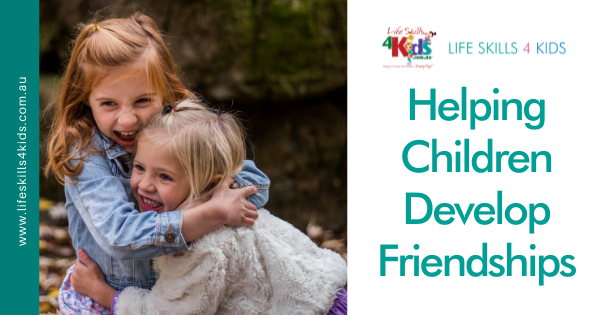By Deb Hopper
Published in The Great Health Guide
Helping Children Develop Friendships – Great Health Guide Article Here
Lots of children develop friendships and enjoy planning and participating in playdates. For some, these skills seem to develop naturally. However, there are also many children who struggle to develop friendships for many reasons. Some children are naturally shy, some children have experienced trauma or abuse and are unsure who they can trust, or may crave friendships that could be unsafe. Many children on the autism spectrum find it difficult to have eye contact and aren’t able to naturally understand social cues.
As a parent, you have a powerful role to play in modelling, teaching and coaching skills for your child to develop friends. Here are 5 top tips for helping your child develop and keep friends for life.
1. Teach kids some mechanics of conversation.
Opening a conversation, knowing what to say, and knowing how to progress a conversation takes some skill. Break the steps of a conversation down.
a. Practice with your child how to say hello and introduce themselves.
“Hi, I’m Maddy. Do you mind if I sit and play next to you”.
b. Teach your child how to talk about their likes and dislikes.
“That’s really great how you like to make cupcakes with your mum. I really like to bake biscuits and decorate them”.
c. Coach your child on not hogging the conversation.
Practice taking turns in conversation. This could be done at home by practicing have a conversation while holding a ball. The person who has the ball can speak and the ball needs to keep moving between people.
d. Teach your child to not only ask questions (which is a great strategy for conversation, but also to offer information about themselves).
2. Help your child learn to read facial expressions.
Practice taking photos with your phone or iPad. Pull funny faces. Play guessing games eg “what feeling do I have when my face is like this?” Play charades or Pictionary to practice acting or drawing out emotions.
3. If a child is showing emotions or behaviours that are not acceptable, ask them to stop, tell them it’s not acceptable and offer/ teach an alternative solution.
Don’t just tell kids, “Don’t to that, we don’t do that in our house”. For example, if they are constantly interrupting conversations say, “Please don’t interrupt us while we are talking (setting a boundary) It’s not polite to interrupt (teaching that it’s not appropriate). How about you wait until we’ve finished in a couple of minutes and then you can ask your question.” This is the strategy, timeline and solution for when they can talk.
4. Ask a friend to come over for a play date and set a common / joint project for them to work on, rather than a competitive activity.
This might include cooking together, creating a joint Lego construction or building a common project in the sand pit. Having a common project allows for lots of opportunities for conversation and problem solving to get to the end of eating the cookies!
5. Open your home to your child’s friends.
This is a great way to keep track of how your child is learning social skills and friendship are developing and allows you to help your child practice the above strategies in a safe and less threatening environment.
Coaching your child to develop good friends will set them up for life in so many ways including making great friends but also for developing and problem solving tricky relationship issues both personally and in the workplace. If your child is finding this skill more difficult to learn, take a breath, step back and choose one of the above suggestions and start with baby-steps. Be encouraging and supportive and be there for your child.
Deb Hopper is an Amazon #1 Best Seller author for her book Reducing Meltdowns and Improving Concentration: The Just Right Kids Technique and Special Needs Reporter for Toddlers to Teens TV. She is passionate about helping children achieve their potential. A practicing Occupational Therapist at Life Skills 4 Kids on the NSW Mid North Coast, Australia, she understands the day to day struggles that children, parents and teachers face.
For a free chapter of her upcoming new book, join our newsletter at www.lifeskills4kids.com.au. You can contact her on 02 6555 9877.
CLICK HERE TO READ FULL MAGAZINE
To check out other great articles download your free copy of Great Health Guide today at
- CLICK icon above
- DOWNLOAD PressReader App
- SEARCH Great Health Guide




